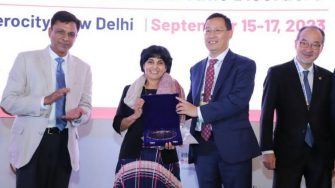Professor Minoti Apte OAM is awarded Palade Prize for excellence in pancreatic research
The Prize recognises world-leading pancreatology researchers.
The Prize recognises world-leading pancreatology researchers.

Professor Minoti Apte OAM from UNSW Sydney has been awarded the Palade Prize by the International Association of Pancreatology (IAP), at the Pancreas 2023 conference in New Delhi.
With only one recipient each year worldwide, the Palade Prize is the most distinguished award of the IAP. It is named after George Palade, who received the Nobel Prize in Physiology or Medicine in 1974 for his work on protein trafficking in the pancreatic acinar cells.
The Palade Prize recognises significant, sustained contribution to the pancreatology field, particularly in understanding fundamental mechanisms of pancreatic physiology and disease pathophysiology. Since the award was established in 2010, Prof. Apte is the first woman to receive it.
“Receiving the Palade Prize was a surprise but also of course an honour. And being the first woman to receive the prize was a big honour,” says Prof. Apte.
Prof. Apte is a Professor of Medicine and Director of the Pancreatic Research Group at the UNSW South West Sydney Clinical Campuses, and the Ingham Institute for Applied Medical Research. An internationally recognised researcher in pancreatic disease, Prof. Apte has served as the Editor-in-Chief of Pancreatology and is the President Elect of the IAP. Prof. Apte has received other major honours including a Medal of the Order of Australia in 2014 and the NSW Premier’s Award for Woman of the Year in 2015.
Prof. Apte first joined UNSW as a PhD student, having completed a medical degree and Masters by Research. During her PhD candidature, Prof. Apte became the first in the world to isolate and culture pancreatic stellate cells (PSCs).
“I’m not sure that I realised it was such a big breakthrough at the time. When you’re doing your PhD, you’re really just focused on finishing that,” Prof. Apte says.
“The realization came a bit later on when we started getting all these invites to speak at various international conferences and forums. That’s when it hit home – this is something that people are really excited about.”
Prof. Apte’s discovery gave rise to a new area of research: pancreatic fibrogenesis, the process by which scar tissue is formed in the pancreas. Through the work of Prof. Apte and others, PSCs are now recognised as key contributors to pancreatic fibrogenesis during chronic pancreatitis and pancreatic cancer.
In pancreatic cancer, PSCs accelerate disease progression in many ways. They produce scar tissue which can form a physical barrier around cancer cells, protecting them from treatments like chemotherapy. Also, PSCs can communicate with the cancer cells, actively encouraging them to multiply and spread to new locations.
According to Prof. Apte, targeting the communication between PSCs and cancer cells could lead to new treatments for pancreatic cancer. More options for patients are urgently needed, with pancreatic cancer having one of the lowest survival rates of all cancers.
“We’ve found that PSCs are helping cancer cells in many different ways. Targeting these interactions could really work,” Prof. Apte says.
According to Prof. Apte, the guidance of her supervisors and mentors, Professors Pirola and Wilson in the early years, and the contributions of her whole research team have been crucial to her success.
“Awards like the Palade Prize are never meant for one person. They’re actually recognising the work of the whole team over the years,” Prof. Apte says.
Another key element is motivation. Prof. Apte’s advice for early-career researchers is to think deeply about why they are pursuing medical research.
“You should be working, not for the reward, but because you want to make a difference. With innovative thinking, hard work, perseverance and God’s grace, you will reap returns.”